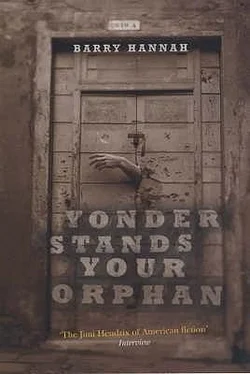She hung up the phone, bereft and held in the sheriff’s arms at the same time. She had never disgusted anyone before.
In their haste to renounce Melanie, the pier crowd did not notice that their cheerleader looked better than she had since middle age. The evidence was that she was reclaiming middle age right now, however briefly, and enjoying it backwards. A smile on some old women does not become them, and they look macabre in their glee. Not so Mrs. Wooten. She was backlit, it seemed, into severe blond on a blue field. She had admirable teeth, for one thing. But the sheriff was drawn and bag-eyed, more like a throttled immigrant at the turn of the century than the video lecturer. Some did now mock him for his race. They weren’t used to Sicilians except around the Gulf Coast, and he was noted as Mafia-eyed by several older viewers, as well as lying fool , for his failures to indict or even locate the killer of Pepper Farté and the butcherer of Frank Booth and Pastor Byron Egan. These people did not fear his wrath or respect his office. Sheriff Facetto despised being unpopular too. For the main part he had acted himself into this job and had intended to grow rapidly in office.
Melanie and Facetto. Love and despair go hand in hand. Sleep in the same bed. In full light she was not confident of herself, but she could not know Facetto was gone in love for her much deeper than appearances. The love was ruining him, he slept with her soul and never got enough of it. What lines bred Melanie? They ought to store the blood in a safe. He was twice in love with her just for lasting.
She studied the large bent dog. Its face made her think of T. S. Eliot’s famous line, “some infinitely gentle, / infinitely suffering thing.” It was an emeritus of the tracks in West Memphis, where Deputy Bernard had confiscated it from a man who had abused it. For Facetto, the greyhound stood for something. What else could comfort this startling creature better than another startling creature, with eyes haunted as if alarmed by its own creation. He gave it to be there in his absence from her.
“When I come back, I want you to’ve named our dog. We don’t know it. You’ll be at the door of your house and tell me the name, and then drop your gown and I’ll get on my knees.”
“Sweet man.”
He thought he knew his killer now and cutter too. It was long quiet work, but he would have him soon. Bernard had seen something and a church trombonist had seen something. But Facetto’s memory of their last acts was driving him around the bend, riding his Melanie to the tune of “Sorcerer’s Apprentice” on the stereo in the next room. She was taken by several supreme moments, a happy crisis she did not know as a possibility. She was sad after the outflow and wept deeply in gratitude. He said he needed to bring her home good news and wouldn’t return until he did. Then he was gone.
Melanie was very weary of what regular people thought. Their thoughts began to hurt and make her weak. Come let me be your grandmother harlot or whatever it is I’m called. Let me be the source of dissension. I never knew Ben Harvard loved me. But fine, fine — let me serve as not only sin but evil around here. I meant to be a scandal all along. Add me to all the hauntings and chaos and lunacy. I am so tired of these old jaws cracking about it. She went back into the house.
For his own pain, Dr. Harvard decided to come down to the pier and see Melanie by accident in his mission of concern about Ulrich and Feeney at large on the barge. Others had gathered when word got out they might be in trouble or lost. Wren, Lewis, the dog Son, who frightened the greyhound back indoors, John Roman and the pale and butchered Egan gathered at the end of the pier. Then Sidney dragged down from his bait-store duties, making a show of anger about his lost trade. Nobody remembered who’d called him. He was off on a mad consumer’s ride, a revenge against lost time and missed women, fun, dice, fine liquor. His language was tougher, glibber than his old talk. Nobody knew quite who he was now. He emulated Man Mortimer, who was changing gravely himself.
They could see tiny specks of life across the lake but no boat. They spoke of the boat as if it were at the bottom of the lake and the old men bobbing and yammering in their life jackets. And what each had planned to read next meditation way up the reservoir near Yazoo — the Indian word for death ghost, was it? Sidney reminded Harvard of all the artistic and nautical effort he had put in the project, forget the pile of money, which nobody else here had, combined.
“All for Miss Melanie too. We know that. A grand boat for a grand swank love, wasn’t it? And your poor wife dying at home all the while, smoking them cigarettes and building up her sad neglected ass with chocolate.”
“You are scum,” said Harvard.
All agreed the sheriff was a strange do-nothing about these troubles. That he was just another fraud of vocality like Bill Clinton. The law was fast cars with whip antennae racing around from one unsolved atrocity to another, screaming radios. Shield on the door ought to read Late, Lard-ass, Last to Know . But expert marksmen on small dogs ruffing in a driveway, or puffed actors in dinner theater, a fit of exhibitionism. Your taxes at work.
Then they spoke of Melanie. “There’ll come the day when it’s right, Harvard. You’ll propose marriage, she’ll accept. The two of you were made for each other. Get married on the barge by Parson Egan here,” Lewis said.
Egan watched the water east and west. He had not uttered a word, and he was ashamed of his carved face, the cross in stitched pieces.
“If you don’t care old sheriff boy been a-tappin it,” said Sidney happily.
“Please.” Harvard had found his own small voice at last.
“The two of ’em come ’round, why you can smell it on ’em,” Sidney insisted.
“You’re a wretched man, if not evil,” cried tall Lewis.
“Not no worse than the truth. Yeah, she got her glass animals and her books and music and now her lawman. She a complete woman.”
Harvard turned and walked up the hill, in grief, they presumed.
John Roman was about to reveal Sidney’s late career between the whores. He liked and admired Harvard tremendously. But then Wren spoke again, hopeful that the lying he had done about Wake Island was forgotten.
“You had to move your mouth and break the best heart here!”
He stepped forward and slapped Sidney across the face. His arm was long and he still had surprising power in it. It was not an idle blow. Sidney sat right down on the beach grass. It seemed Wren was not through, and John Roman moved up to restrain him. But you thought he might be wanting a piece of Sidney too. Everybody did.
Sidney, huddled down, delirious in spite, was glad to see that in their unhappiness the others now turned on each other. John Roman got Wren in a half nelson and started dragging him away from Sidney. Lewis kicked at Sidney’s face, missed, came again. Sidney took a blow right into the heaving place and began rolling and firing projectile vomit. Got some on the poor stitched Frankensteinish Byron Egan, who was attempting to intervene. Son pranced around, barking and wagging his tail. Across the lake they heard at an immense distance what sounded like serial gunfire and turned. All this while, Egan, silent about his attacker, pleaded for the flock to return to itself.
Ulrich and Feeney approached the pier and slowed, observing the etiquette of the small wake. They were doing fine, nothing going over had been senile or forgetful. It was just that Ulrich was relying on Feeney for a bit of navigation and Feeney didn’t see right, nor did he acknowledge this to himself, so he had taken them out of their way a bit. Now he thought he saw a sail come up on the pier, and a boat, hoisted by its small crew. What was happening was that armed children were making a barricade on the end of their pier at the behest of the camp founders, Gene and Penny Ten Hoor.
Читать дальше











